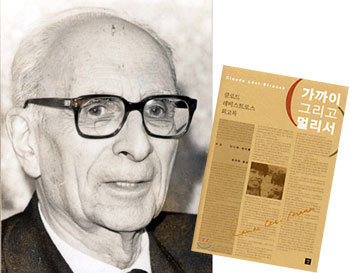A Confession of an Anthropologist Who Wandered in Search of Ego
A Confession of an Anthropologist Who Wandered in Search of Ego
Posted February. 07, 2003 22:52,

To those who are majoring in anthropology or those who have even a slight interest in anthropological texts, Claude Levi-Strauss always has been a spiteful and cold-hearted person. Its because he is an anthropologist who caused me to blame myself for not understanding what hes trying to say in despite of how much I read and read the original text or the translated copy. What a lot of shameful times when I spoke as if I have read the original texts but have just looked through a couple of bibliographical introductions? But, this book helped me to boldly drop this kind of my cowardice.
This book is written by a sharp science reporter, Didie Eribourg, and consists of numerous stories that are in the mind and the heart of the enormous anthropologist, Levi-Strauss. She uses a method of picking out these stories as if she is weaving out a textile with brilliant shapes by using various threads. In here, by Eribourg being a highly trained anthropologist and Levi-Strauss being a primary information provider, they have completed one of the ethnography.
This book is divided into four major parts. The first part is based on the relationships Levi-Strauss had had with a wide range of people throughout his life. Reading how he got his academic inspiration from the relations, you will understand the large picture of the great modern-day philosophy. Cordial and sour relations he had with French philosophers and English and American scholars had given a great influence on his works in various ways. Levi-Strauss speaks about such great figures as Hegel, Rousseau, Marx, Freud, Lacan, Jacobson, Braudel, Sartre, Bergson, Ernst, Boas and many more.
The second part explores Levi-Strauss as an individual, a scholar and a member of the society and takes a look at how he tried to harmonize the different statuses he held. Since an individual level of Levi-Strauss has hardly been revealed through his books, this approach is very interesting. It explains how he became interested in South American Indian culture as he changed his major from philosophy to ethics; the fact that he almost gave up becoming a professor before he was appointed as a professor at Colage France in his third attempt; the inner conflict he went through about not being an activist and merely being a professor as he got devoted to socialism; his critical view about the 1968 student revolution; and the 20 hard-working years he devoted to writing the quadrilogy `Mythology.` Levi-Strauss called the stringent and painful self-discipline for work `Don quixotic` nature. He saw the quest for the past made it possible for an individual to defend him or herself from the boredom of life. According to him, works always made him feel uneasy, but at the same time helped him forget the passing of time.
In the third part, Levi-Strauss explains specifically various concepts he wrote in his books. `Female exchange` as a social sign; psychology and psychiatrics that influences the human quest for universal homogeneity; Marxism that is essential to understand the existence as a doer; the `structure` concept he thinks people has abused unlike his intention; his critical view about Sartre existentialism that tries to separate the subject from the object; `mythological thinking` that exists in the modern age in a different way from in the pre-modern age; `concrete science` that transcends the confrontation between emotion and intelligence; and `comparison theory` based on correlations.
The last part is about his deep affection towards anthropology, a field of study he devoted his whole life to develop. He sees Rousseau as the inventor of human science who sought to combine the emotional and the intelligent world. He notes, `Marx and Freud makes me think, but with Rousseau I get passionate,` implying that he got the most primitive anthropologic inspiration from Rousseau. He says he writes confession because an ethnologist must be detached from himself through the process of soul searching. Ethnologic experience is about exploring a new world by escaping from who he is. If the ethnologist thinks he knows about himself too much, it is not easy to go out there to a new land for an adventure. The remarks that an anthropologist writes about himself by recording ethnic findings may be a confession from a soul-searching anthropologist. Levi-Strauss ends his interview with Erribon by saying anthropology will not be able to find an answer for everything, which exhibits his true affection toward his work.
We pay a tribute to the passionate scholar and philosopher. It is sad that he has limited time before him.
Ryu Jeong-ah, Lecturer of Anthropology at Seoul Natl University







